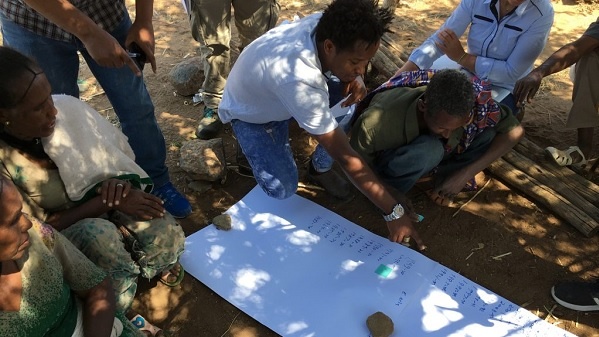
NEW YORK CITY (Columbia University) – The Adapting Agriculture to Climate Today, for Tomorrow Columbia World Project (ACToday) has been working with its Ethiopian partners to create new climate tools for decision makers working in agriculture and food security. These investments are now directly enabling the World Food Programme (WFP) to reach its 2022 target of providing a million smallholder farmers in Ethiopia with affordable insurance against droughts and other climate risks.
The new target is part of WFP’s goal to scale up its R4 Rural Resilience Initiative, which helps farming communities increase their food security and income by managing climate-related risks.
In 2009, Oxfam America, in collaboration with the International Research Institute for Climate and Society and other partners, launched the Horn of Africa Risk Transfer for Adaptation (HARITA) project in one village of 200 farms in Ethiopia.
HARITA transitioned to R4 when the World Food Programme became involved. Today, R4 reaches nearly 90,000 farms in Ethiopia, Kenya, Malawi, Senegal, Zambia and Zimbabwe, supporting them to diversify their livelihoods, increase their savings and get access to microcredit and affordable index-based insurance. In 2018, participating farmers received nearly $1.5 million of insurance payouts to compensate for weather-related losses.
The Ethiopian government ultimately wants all of its vulnerable farmers to be covered by insurance. During times of drought, insurance helps farmers and their families keep food on the table. In non-drought years, insurance coverage helps farmers feel safe to take out loans to buy fertilizer and other inputs that can significantly increase their yields.
“If all of Ethiopia’s vulnerable farmers could be reached by insurance, this could totally change the landscape for food security,” said economist Dan Osgood, who leads ACToday’s insurance work. “R4 is a highly visible and successful project that has already helped large numbers of farmers improve their savings and wealth. We’re excited to help WFP reach hundreds of thousands more.”
Osgood said many index insurance projects have languished over the past decade primarily because they have a top-down approach that ineffectively uses technology and isn’t designed with enough farmer participation. “We’ve seen it happen time and time again.”
ACToday’s work in Ethiopia is making it possible to avoid these pitfalls, he said.
Continue reading this story on Columbia University’s International Research Institute for Climate and Society
About ACToday
ACToday is the first Columbia World Project. It aims to combat hunger by increasing climate knowledge in six countries that are particularly dependent on agriculture and vulnerable to the effects of climate variability and change: Bangladesh, Colombia, Ethiopia, Guatemala, Senegal and Vietnam.
